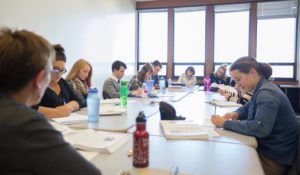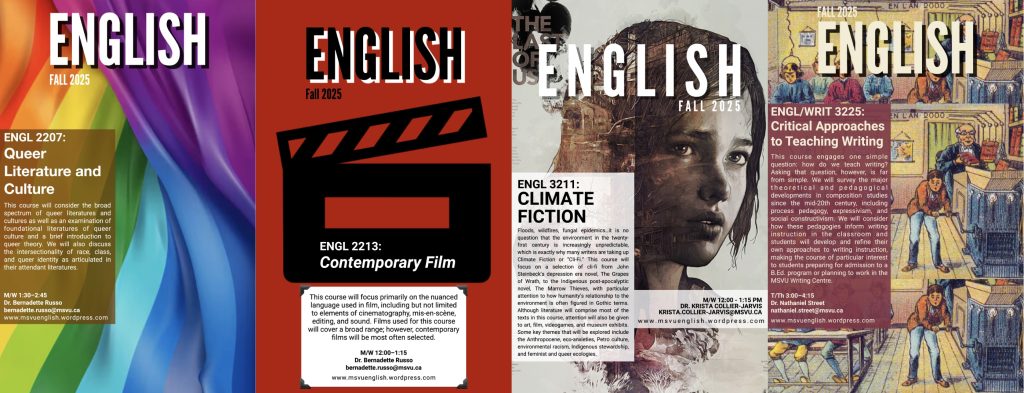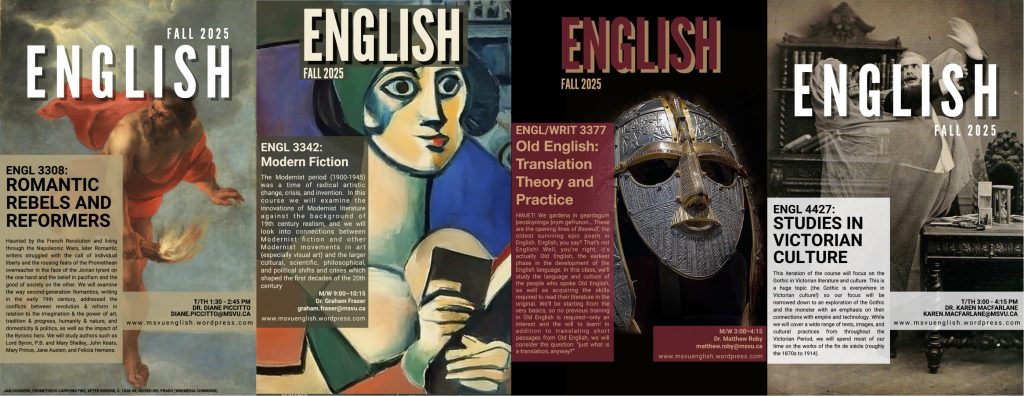
Courses at the 3000 or 4000 level require successful completion of at least one unit of literature at the 1000 level. At least one unit at the 2000 level is recommended.
English Department seminar. Photo: Krista Hill
ENGL 3211 Special Topic: Climate Fiction / 0.5 unit
Fall term
01F TTh 10:30-11:45
Instructor: Prof. K. Collier-Jarvis
Floods, wildfires, fungal epidemics…it is no question that the environment in the twenty- first century is increasingly unpredictable, which is exactly why many writers are taking up Climate Fiction or “Cli-Fi.” This course will focus on a selection of cli-fi from The Epic of Gilgamesh (2100-1200 B.C.E), one of the oldest known literary texts, to The Marrow Thieves (2017), an Indigenous post-apocalyptic novel, with particular attention to how humanity’s relationship to the environment is often figured in Gothic terms. Although literature will comprise most of the texts in this course, attention will also be given to art, film, video games, and museum exhibits. Some key themes that will be explored include the Anthropocene, eco-anxieties, Petro culture, environmental racism, the New Weird, Indigenous stewardship, and feminist and queer ecologies.
ENGL/WRIT 3225 Critical Approaches to Teaching Writing: Histories, Practices, and Pedagogies / 0.5 unit
Fall term
01F TTh 12:00-1:15
Instructor: Prof. N. Street
This course engages one simple question: how do we teach writing? Engaging that question, however, is far from simple. The history of composition studies emerged humbly enough, with a demand, in the late 19th and early 20th centuries, to prepare less-privileged students (the kind who didn’t grow up with Latin tutors) to take university literature courses. In other words, we could say that composition studies began in 1885, with a newly mandated course at Harvard titled “English A.” Over the course of the next 50 years, the mandatory first-year writing course spread across North America. Most instructors of these courses were literary scholars who “paid their dues” teaching first-year writing until they could get a “real job” teaching literature. Those who did not “advance” (disproportionately women) made careers teaching writing.
Something happened in the 100-or-so-years after the start of English A. Instructors discovered that teaching writing is not simply a matter of teaching the “basics” of grammar and genre so students would be ready for “real” or “more advanced” studies. Instructors realized that the teaching of writing requires research, philosophical care, and pedagogical sophistication. In short, it requires a field of study dedicated to better understanding what writing is, how we relate to it, and how we are able to learn and teach it.
This course surveys the major theoretical and pedagogical developments in composition studies since the mid-20th century. We will pay particular attention to “process pedagogy,” which treats writing as a fluid, non-linear, process rather than as a product to “get right.” We will further cover other major theories that inform contemporary pedagogy, including expressivism, social-constructivism, and feminist critiques of prevalent modes of teaching. We will consider how these pedagogies inform writing instruction both in the classroom and in tutoring.
This course will provide ample opportunities for experiential learning. Through a series of workshops, students will tutor each other, using their own writing as case-studies. Additionally, students will develop and refine their own approaches to writing instruction and articulate that approach in a Statement of Teaching Philosophy. This course should be of particular interest to students preparing for admission to a B.Ed. program and/or wish to work in the MSVU Writing Centre.
ENGL 3308 Romantic Rebels and Reformers / 0.5 unit
Fall term
01F TTh 1:30-2:45
Instructor: Prof. D. Piccitto
The need for socio-political change, particularly with individual and group rights as well as parliamentary reform, persisted throughout the Romantic period (ca. 1785-1835). While the more immediate context for the second half of this era was the reign and subsequent fall of Napoleon Bonaparte along with the Napoleonic Wars, the French Revolution continued to both inspire and haunt the imagination of a generation of writers who were either very young or not yet born when this historic event transpired. They struggled with the call of individual liberty and the rousing feats of the Promethean overreacher in the face of the Jovian tyrant on the one hand and the belief in pacifism and the good of society on the other. In this course, we will examine various manifestations of socio-political conflicts as well as the viability of slow reform rather than violent revolution in relation to the imagination, the power of art, nature, tradition versus progress, individualism versus social good, the domestic versus political sphere, primarily in the writings of second-generation or later Romantic writers such as Jane Austen, Lord Byron, Felicia Hemans, John Keats, Mary Prince, and P.B. and Mary Shelley. ENGL 3307 is recommended but not required.
ENGL 3310 Indigenous Literatures: Indigenous Horror / 0.5 unit
Winter term
01W TTh 1:30-2:45
Instructor: Prof. K. Collier-Jarvis
Is there an Indigenous horror? Indigenous vampires, yes! Indigenous zombies…maybe? What about Indigenous retellings of Frankenstein…? The twenty-first century has increasingly witnessed a rise in what might be termed “Indigenous horror,” from the works of Stephen Graham Jones (Blackfoot) to the films of Jeff Barnaby (Mi’kmaw) to the proliferation of short story collections, such as Never Whistle at Night. Responding to the growing popularity of Indigenous horror, this course will attend to the various ways in which these works draw on the horror genre to represent Indigenous lived experience. Some key topics that will be engaged include trauma mining, monsters and monstrosity, revenge horror, and fourth cinema.
ENGL/WRIT 3330 Myths and Theories about Writing / 0.5 unit
Winter term
01W TTh 12:00-1:15
Instructor: Prof. N. Street
Is writing just second-rate speaking? What does it mean to be an author? Does writing communicate? If so, what? And what is writing, anyway? Beginning with Plato’s Phaedrus, wherein Socrates warns that writing will degrade “living” thought, this course tackles the mythological foundations of writing.
This course is structured as an extended meditation on the question of writing. At all points, we could reduce the class and its texts to a handful of simple questions: what is writing? how does it work? how does it affect us? Our course texts will engage these questions from a variety of angles that take into account the mythos of writing. We will treat myth in several ways: as false beliefs about writing that must be re-considered, as legendary points of origin that need to be sifted through, and as a kind of power that must be articulated. We’ll do this by discussing key philosophical and literary texts in class, but you’ll do much of your thinking-work by writing through the texts and the problems and theories they engage. Thus, part of the class’ goal is to both theorize and perform the mythological power of writing.
ENGL 3342 Modern Fiction / 0.5 unit
Fall term
01F MW 9:00-10:15
Instructor: Prof. G. Fraser
This course will explore some facets of Modernism through reading works by some of the major novelists of the period. We will examine the innovations of Modernist literature against the background of 19th-century realism, in terms of both the forms and content of the works we read. We will also look into connections between Modernist fiction and other Modernist movements in art (especially visual art) and the larger cultural, scientific, philosophical, and political shifts and crises which informed the Modernist period.
While these works represent some of the greatest ambitions and achievements of twentieth century literature, they are also often dense, demanding, and even intentionally difficult and obscure. This course will aim to help you approach these complex works, but we will also examine why an artist would choose to write in a “difficult” manner in the first place, with special reference to the nature of art and the artist as represented in the works themselves.
Tentative Text List: Conrad, Heart of Darkness; Faulkner, As I Lay Dying; Joyce, Portrait of the Artist as a Young Man; Kafka, The Trial; Toomer, Cane; Rhys, Good Morning, Midnight; Woolf, To The Lighthouse.
ENGL 3346 Contemporary Literature / 0.5 unit
Winter term
01W MW 9:00-10:15
Instructor: Prof. G. Fraser
This course examines some of the concerns of contemporary postmodern fiction. We will pay particular attention to postmodern conceptions of authorship, history, memory, autobiography, and the role of material objects in culture and fiction. We will also examine the ways in which these texts challenge the traditional boundaries between fiction and other textual forms (poetry, the image, non-fiction genres) and their efforts to bend or re-create language and fictional form into new shapes. Some of these works are popular in orientation and others are more obscure – all, however, are important and compelling works of literature which offer a great deal to think about and enjoy.
Tentative Text List:
Baker, The Mezzanine; Beckett, Nohow On; Brossard, Mauve Desert; Carey, Alva and Irva; Carson, The Autobiography of Red; Hoban, Riddley Walker; Johnson, The Unfortunates; Marcus, The Age of Wire and String; Sebald, Rings of Saturn; Shapton, Important Artifacts…
ENGL 3364 Shakespeare’s Contemporaries / 0.5 unit
Winter term
01W TTh 3:00-4:15
Instructor: Prof. L. Templin
The ghost of Hamlet’s father and the Weird Sisters in Macbeth were not the only supernatural creatures on the early modern stage. The early modern period was a time in which scholars and theologians explored the occult properties of the natural world, experimented with alchemical reactions and debated ideas about the supernatural, both divine and demonic. Modern science was in its infancy, religious reforms had changed the way people thought about the world, and witch hunts broke out across Europe. This course will examine representations of the supernatural including ghosts, magic, and witchcraft on the early modern English stage. We will consider the position of the English commercial theatre as a venue of popular entertainment and how Shakespeare’s contemporaries used theatrical conventions and innovations over a range of theatrical genres to explore learned ideas about magic and the otherworldly, popular concerns about magic, gendered ideas about witchcraft, and the theatrical spectacle of real-life witch trials, amidst growing skepticism.
Tentative course texts include Thomas Kyd, The Spanish Tragedy (1589); Christopher Marlowe, Doctor Faustus (1592); Robert Greene, Friar Bacon and Friar Bungay (1594); Thomas Middleton, The Witch (1613); Thomas Dekker, John Ford, and William Rowley, The Witch of Edmonton (1621); Thomas Heywood and Richard Brome, The Late Lancashire Witches (1634). We will also be reading short excerpts from demonological treatises, witchcraft pamphlets, and archival documents.
ENGL 3377 Old English: Translation Theory and Practice / 0.5 unit
Fall term
01F MW 3:00-4:15
Instructor: Prof. M. Roby
HWÆT! We gardena in geardagum þeodcyninga þrym gefrunon… These are the opening lines of Beowulf, the oldest surviving epic poem in English literature. English, you say? That’s not English! Well, you’re right, it’s actually Old English, the earliest phase in the development of the English language. In this class, we’ll study the language and culture of the people who spoke Old English, as well as acquiring the skills required to read their literature in the original. We’ll be starting from the very basics, so no previous training in Old English is required—only an interest and the will to learn! While practising and composing our own short translations, we’ll also consider the art of translation in itself, asking ourselves “what is a translation, anyway?” and “why are translations not always (or even often) just word-for-word conversions from one language to another?”
ENGL 3378 Old English: Beowulf, Then and Now / 0.5 unit
Winter term
01W MW 3:00-4:15
Instructor: Prof. M. Roby
Building on the skills developed in ENGL/WRIT 3377, students will continue their language training and translation practice in Old English. The focus of this class will be on Beowulf, the oldest surviving epic poem in English, and will include an intensive study of that poem, its many translations, and its adaptations and re-imaginings in literature and cinema. Texts may include the translations by Seamus Heaney and J.R.R. Tolkien, the novel The Mere Wife by Maria Dahvana Headley, the graphic novel Bea Wolf by Zach Weinersmith and Boulet, and the 2007 film Beowulf by Robert Zemeckis (starring a golden, CGI Angelina Jolie as Grendel’s mother).
ENGL 4408 Critical Theory / 0.5 unit
Winter term
01W TTh 10:30-11:45
Instructor: Prof. K. Macfarlane
This course continues where ENGL 2202 Critical Methods left off. We will focus on the major theorists and theoretical works that have shaped the ways we read and think about literature and culture in the twenty-first century. Our focus will be on the “posts” in contemporary theory (with selected readings from foundational texts from earlier periods): poststructuralism, postcolonialism, post-queer, post-feminist and so on… Our discussions will be based on primary theoretical texts, but we will also be discussing selected works from popular culture as a way of thinking about the ways in which theory becomes methodology.
ENGL 4427 Studies in Victorian Culture / 0.5 unit
Fall term
01F TTh 3:00-4:15
Instructor: Prof. K. Macfarlane
This course will focus on the Gothic in Victorian literature and culture. This is a huge topic (the Gothic is everywhere in Victorian culture!) so our focus will be narrowed down to an exploration of the Gothic and the monster with an emphasis on their connections with empire and technology. While we will cover a wide range of texts, images, and cultural practices from throughout the Victorian Period, we will spend most of our time on the works of the fin de siècle (roughly the 1870s to 1914). We will also be reading selected theoretical and contextual works to provide us with a framework for our discussions. Emphasis will be on active discussion and ongoing engagement with the material.
Tentative text list: Robert Louis Stevenson, The Strange Case of Dr. Jekyll and Mr. Hyde; Bram Stoker Dracula; Richard Marsh, The Beetle; and selected short stories, images, and primary textual material.
ENGL 4480 Studies in Literature and Film / 0.5 unit
Winter term
01W MW 12:00-1:15
Instructor: Prof. B. Russo
This course will consider the multi-faceted relationship between literature and film from a range of film theoretical perspectives and practices. This semester we will center our explorations around the issues of adaptation and the construction of gender.


